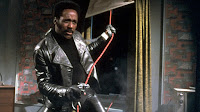Once again, I'm looking back at previous installments of some of this summer's big returning franchises.
Although the blaxploitation movement is generally built around scrappy, sometimes very rough low-budget productions, the genre's most famous movie is actually a slick, studio-backed film that won an Oscar. I haven't seen a lot of blaxploitation films (I'm pretty sure Super Fly and Black Caesar are the only other ones I've watched), but Shaft is definitely the best of what I've seen, an entertaining, well-acted detective story that effectively mixes social commentary with its old-fashioned crime story. It's still gritty and authentic, showing audiences a side of New York City that mainstream moviegoers wouldn't have been familiar with, but it's less confrontational than some movies in the genre, making more of an effort to reach a wider range of viewers (i.e., white people).
That's not necessarily a criticism, since one of the key themes is the way that private detective John Shaft (Richard Roundtree) is able to move between two worlds, connecting with the white police establishment and with the underground of Black Power groups and low-level hustlers. It's an ability that serves him well as a private detective, but it also means that he's never quite accepted by any of the people he interacts with. The cops don't trust him to give them all the information they need to bring in the criminals he associates with, and the African-American activists see him as a sell-out. There's no indication that any of this bothers him, though, and he sticks to his personal code of ethics regardless of who he's dealing with.
The specific plot, taken from the novel by Ernest Tidyman (who co-wrote the screenplay with John D.F. Black), isn't all that innovative or exciting, and it proceeds in a pretty straightforward manner, without any big twists. Shaft gets hired by Harlem crime boss Bumpy Jonas (Moses Gunn) to find Bumpy's kidnapped daughter, who's become a pawn in the war between Bumpy and white mobsters from out of town. Once Shaft figures out who took the daughter, he basically just goes in and gets her, in an impressively staged action sequence at a hotel. What's more interesting than the plot is the way the movie follows Shaft around NYC, giving a tour of the city's underrepresented areas and presenting a range of colorful characters.
Roundtree, in his first film role, is fantastic as Shaft, making the detective charismatic and sharp and, of course, sexy, as Isaac Hayes' iconic, Oscar-winning theme song describes him. Shaft's dalliances with women are an essential part of his character, and while he casually sleeps around, he never mistreats the women he's with. The sex scenes are sensual but not sleazy, and director Gordon Parks, who worked mainly as a photographer, has an eye for artful compositions in the bedroom as well as on the streets. Hayes' funky, off-kilter music perfectly complements Parks' imagery, and I was more impressed with the use of music here even than with Curtis Mayfield's equally famous soundtrack to Super Fly.
Shaft's narrative drags in the middle, as the title character spends a lot of time just walking around aimlessly, but it's a solid mystery framework for the movie's exploration of contemporary NYC life, and it's no surprise that Shaft returned for more movie adventures (as well as a short-lived TV series). He's an appealing, durable character, and the movie effectively sparks interest in more of his cases.




No comments:
Post a Comment